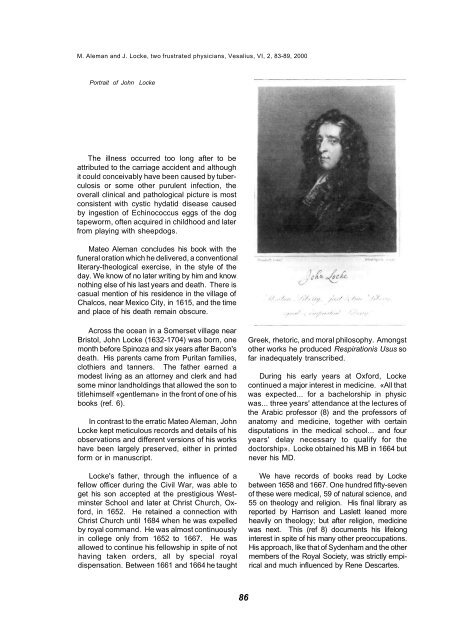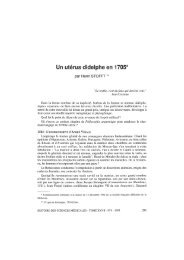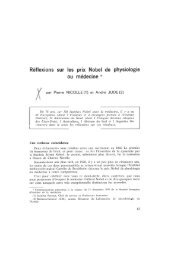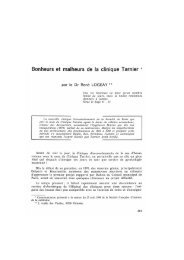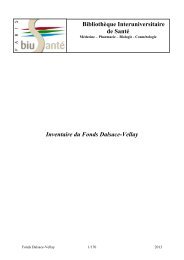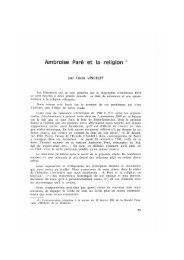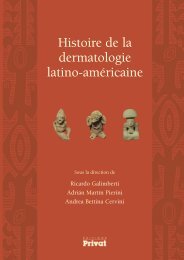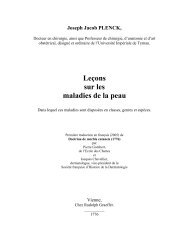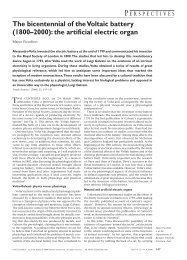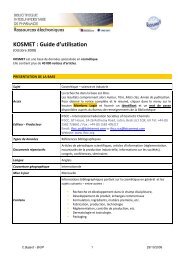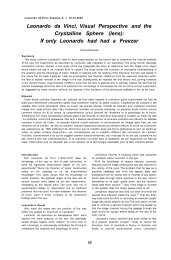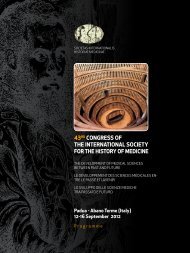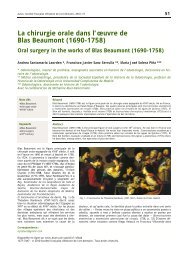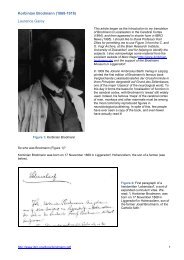M. Aleman and J. Locke, two frustrated physicians, Vesalius, VI, 2, 83-89, 2000• Portrait <strong>of</strong> Frai Garcia GuerraFrai Garcia Guerra (1560-1612) was born inFromista, a region through which <strong>the</strong>re wereyearly migrations <strong>of</strong> <strong>la</strong>rge herds <strong>of</strong> sheep, arecurrent event down to <strong>the</strong> present, establishedby medieval <strong>la</strong>w (5). This migration p<strong>la</strong>ys animportant role in <strong>la</strong>ter <strong>de</strong>velopments.The <strong>de</strong>tails <strong>of</strong><strong>the</strong> cleric's career are skimpy bu<strong>the</strong> seemed to have been eloquent, socially attractiveto <strong>the</strong> members <strong>of</strong> <strong>the</strong> court, and <strong>the</strong> recipient<strong>of</strong> special preferments and promotions. He had beena friar <strong>of</strong> <strong>the</strong> Convent <strong>of</strong> Santo Domingo in Val<strong>la</strong>dolidand probably its prior, but apparently had nomajor administrative position before his appointmentto Mexico. From all accounts he was a kindlyand liberal man, as shown not only by his support<strong>of</strong> Aleman but <strong>of</strong> at least one o<strong>the</strong>r prominentwriter, Juan Ruiz <strong>de</strong> A<strong>la</strong>rcon, whom Pr<strong>of</strong>essor FranciscoMarquez has i<strong>de</strong>ntified as a member <strong>of</strong> animportant Sevillian family <strong>of</strong> converts (6). MateoAleman <strong>de</strong>voted his <strong>la</strong>st work to events following<strong>the</strong> arrival <strong>of</strong> <strong>the</strong> archbishop in Veracruz in Mexico.Intriguingly, <strong>the</strong> writer on <strong>la</strong>nding is said to have hadas <strong>the</strong> only book in his possession <strong>the</strong> first edition <strong>of</strong>Don Quixote, which was impoun<strong>de</strong>d by <strong>the</strong> Inquisition.It was restored by <strong>the</strong> pre<strong>la</strong>te's intervention.Los Sucesos <strong>de</strong>. Frai Garcia Gera (sic) (TheEvents <strong>of</strong> Frai Garcia Guerra) was published inMexico in 1613 by C. Adriano Cesar (imprenta <strong>de</strong><strong>la</strong> Viuda <strong>de</strong> Belli). An extremely rare work, it wasfortunately reissued in two mo<strong>de</strong>rn versions (7).It is an account <strong>of</strong> <strong>the</strong> life <strong>of</strong> <strong>the</strong> archbishop afterhis <strong>la</strong>nding in Mexico, his many misadventures,his long and painful illness, <strong>de</strong>ath, and autopsy.Events were ominous and tragic from <strong>the</strong>beginning. Almost immediately <strong>the</strong> coach inwhich he was traveling tipped over, though withno reported injuries. Shortly <strong>the</strong>reafter<strong>the</strong> p<strong>la</strong>tformfrom which he was reviewing a para<strong>de</strong> in hishonor gave way, crushing an Indian un<strong>de</strong>r it.Ano<strong>the</strong>r one was killed when he fell <strong>of</strong>f a «flyingtree», <strong>the</strong> Aztec equivalent <strong>of</strong> a maypole. Moreseriously, <strong>the</strong> mules pulling <strong>the</strong> pre<strong>la</strong>te's coachgalloped out <strong>of</strong> control and he jumped out <strong>of</strong> <strong>the</strong>coach, suffering major bruises when he fell. Hisphysicians <strong>la</strong>ter attributed his ill health to thisacci<strong>de</strong>nt, a wrong diagnosis, as I hope to prove.In 1611 <strong>the</strong> Viceroy Luis <strong>de</strong> Ve<strong>la</strong>sco wasappointed to a higher post in Spain. The archbishopwas named his temporary successor,not an unusual event un<strong>de</strong>r <strong>the</strong> circumstances.During <strong>the</strong> transition, an eclipse occurred and avolcanic eruption showered <strong>the</strong> city with ashes.Astrologers c<strong>la</strong>imed that <strong>the</strong>se events presaged«<strong>the</strong> <strong>de</strong>ath <strong>of</strong> <strong>the</strong> prince <strong>of</strong> <strong>the</strong> church» (ref. 4).Two major earthquakes followed in quicksuccession and <strong>the</strong> viceroy-bishop had to retireto his pa<strong>la</strong>ce feeling ill and feverish. Aleman<strong>de</strong>scribes in <strong>de</strong>tail subsequent events: bloodletting,purges, punctures, and <strong>de</strong>terioration <strong>of</strong><strong>the</strong>patient. A hepatic lesion was diagnosed, thoughwithout mention <strong>of</strong> jaundice. On January 28,1612, as a <strong>de</strong>sperate measure, a chest drainagewas attempted, «too high», according to Aleman.Nothing was accomplished and <strong>the</strong> patientdied on February 22.The <strong>de</strong>scription <strong>of</strong> <strong>the</strong> autopsy is meticulousand vivid : «an abscess <strong>of</strong> <strong>the</strong> liver, <strong>the</strong> size <strong>of</strong>half an egg», a chest abscess with <strong>the</strong> lower ribs«so rotten that <strong>the</strong>y crumbled between <strong>the</strong>fingers», and <strong>the</strong> brain so swollen that <strong>the</strong>examiners were unable to push it back into <strong>the</strong>cranium. (It was buried immediately, severaldays before <strong>the</strong> main funeral) (ref. 5).85
M. Aleman and J. Locke, two frustrated physicians, Vesalius, VI, 2, 83-89, 2000Portrait <strong>of</strong> John LockeThe illness occurred too long after to beattributed to <strong>the</strong> carriage acci<strong>de</strong>nt and althoughit could conceivably have been caused by tuberculosisor some o<strong>the</strong>r purulent infection, <strong>the</strong>overall clinical and pathological picture is mostconsistent with cystic hydatid disease causedby ingestion <strong>of</strong> Echinococcus eggs <strong>of</strong> <strong>the</strong> dogtapeworm, <strong>of</strong>ten acquired in childhood and <strong>la</strong>terfrom p<strong>la</strong>ying with sheepdogs.Mateo Aleman conclu<strong>de</strong>s his book with <strong>the</strong>funeral oration which he <strong>de</strong>livered, a conventionalliterary-<strong>the</strong>ological exercise, in <strong>the</strong> style <strong>of</strong> <strong>the</strong>day. We know <strong>of</strong> no <strong>la</strong>ter writing by him and knownothing else <strong>of</strong> his <strong>la</strong>st years and <strong>de</strong>ath. There iscasual mention <strong>of</strong> his resi<strong>de</strong>nce in <strong>the</strong> vil<strong>la</strong>ge <strong>of</strong>Chalcos, near Mexico City, in 1615, and <strong>the</strong> timeand p<strong>la</strong>ce <strong>of</strong> his <strong>de</strong>ath remain obscure.Across <strong>the</strong> ocean in a Somerset vil<strong>la</strong>ge nearBristol, John Locke (1632-1704) was born, onemonth before Spinoza and six years after Bacon's<strong>de</strong>ath. His parents came from Puritan families,clothiers and tanners. The fa<strong>the</strong>r earned amo<strong>de</strong>st living as an attorney and clerk and hadsome minor <strong>la</strong>ndholdings that allowed <strong>the</strong> son totitlehimself «gentleman» in <strong>the</strong> front <strong>of</strong> one <strong>of</strong> hisbooks (ref. 6).In contrast to <strong>the</strong> erratic Mateo Aleman, JohnLocke kept meticulous records and <strong>de</strong>tails <strong>of</strong> hisobservations and different versions <strong>of</strong> his workshave been <strong>la</strong>rgely preserved, ei<strong>the</strong>r in printedform or in manuscript.Locke's fa<strong>the</strong>r, through <strong>the</strong> influence <strong>of</strong> afellow <strong>of</strong>ficer during <strong>the</strong> Civil War, was able toget his son accepted at <strong>the</strong> prestigious WestminsterSchool and <strong>la</strong>ter at Christ Church, Oxford,in 1652. He retained a connection withChrist Church until 1684 when he was expelledby royal command. He was almost continuouslyin college only from 1652 to 1667. He wasallowed to continue his fellowship in spite <strong>of</strong> nothaving taken or<strong>de</strong>rs, all by special royaldispensation. Between 1661 and 1664 he taughtGreek, rhetoric, and moral philosophy. Amongsto<strong>the</strong>r works he produced Respirationis Usus s<strong>of</strong>ar ina<strong>de</strong>quately transcribed.During his early years at Oxford, Lockecontinued a major interest in medicine. «All thatwas expected... for a bachelorship in physicwas... three years' attendance at <strong>the</strong> lectures <strong>of</strong><strong>the</strong> Arabic pr<strong>of</strong>essor (8) and <strong>the</strong> pr<strong>of</strong>essors <strong>of</strong>anatomy and medicine, toge<strong>the</strong>r with certaindisputations in <strong>the</strong> medical school... and fouryears' <strong>de</strong><strong>la</strong>y necessary to qualify for <strong>the</strong>doctorship». Locke obtained his MB in 1664 butnever his MD.We have records <strong>of</strong> books read by Lockebetween 1658 and 1667. One hundred fifty-seven<strong>of</strong> <strong>the</strong>se were medical, 59 <strong>of</strong> natural science, and55 on <strong>the</strong>ology and religion. His final library asreported by Harrison and Laslett leaned moreheavily on <strong>the</strong>ology; but after religion, medicinewas next. This (ref 8) documents his lifelonginterest in spite <strong>of</strong> his many o<strong>the</strong>r preoccupations.His approach, like that <strong>of</strong> Sy<strong>de</strong>nham and <strong>the</strong> o<strong>the</strong>rmembers <strong>of</strong> <strong>the</strong> Royal <strong>Society</strong>, was strictly empirica<strong>la</strong>nd much influenced by Rene Descartes.86
- Page 1 and 2: Official journal of the Internation
- Page 3 and 4: Editorial, Vesalius, VI, 2, 82, 200
- Page 5: M. Aleman and J. Locke, two frustra
- Page 9 and 10: M. Aleman and J. Locke, two frustra
- Page 11 and 12: J.J. Virey et la naissance de la ch
- Page 13 and 14: J.J. Virey et la naissance de la ch
- Page 15 and 16: J.J. Virey et la naissance de la ch
- Page 17 and 18: J.J. Virey et la naissance de la ch
- Page 19 and 20: J.J. Virey et la naissance de la ch
- Page 21 and 22: Oriental medical manuscripts in Uzb
- Page 23 and 24: Oriental medical manuscripts in Uzb
- Page 25 and 26: Oriental medical manuscripts in Uzb
- Page 27 and 28: M.-A. Paulze, épouse et collaborat
- Page 29 and 30: M.-A. Paulze, épouse et collaborat
- Page 31 and 32: M.-A. Paulze, épouse et collaborat
- Page 33 and 34: M.-A. Paulze, épouse et collaborat
- Page 35 and 36: Physiology at the University of Tur
- Page 37 and 38: Physiology at the University of Tur
- Page 39 and 40: Physiology at the University of Tur
- Page 41 and 42: La collection Léo-Errol Pariseau,
- Page 43 and 44: La collection Léo-Errol Pariseau,
- Page 45 and 46: La collection Léo-Errol Pariseau,
- Page 47 and 48: La collection Hiram Winnet Orr, Ves
- Page 49 and 50: La collection Hiram Winnet Orr, Ves
- Page 51 and 52: Vesalius, VI, 2, 130-132, 2000Place
- Page 53 and 54: Vesalius, VI, 2, 130-132, 2000The b
- Page 55 and 56: Vesalius, VI, 2, 133-135, 2000Finan
- Page 57 and 58:
Vesalius, VI, 2, 136-150, 2000Compt
- Page 59 and 60:
Vesalius, VI, 2, 136-150, 2000chang
- Page 61 and 62:
Vesalius, VI, 2, 136-150, 2000Il y
- Page 63 and 64:
Vesalius, VI, 2, 136-150, 20006. Ra
- Page 65 and 66:
Vesalius, VI, 2, 136-150, 2000les c
- Page 67 and 68:
Vesalius, VI, 2, 136-150, 2000Grèc
- Page 69 and 70:
Vesalius, VI, 2, 136-150, 2000et l'
- Page 71 and 72:
Vesalius, VI, 2, 136-150, 2000Disco
- Page 73 and 74:
Vesalius, VI, 2, 151-154, 2000unive
- Page 75 and 76:
Vesalius, VI, 2,151-154, 2000Sleim
- Page 77 and 78:
Vesalius, VI, 2, 156, 2000Informati
- Page 79 and 80:
Vesalius, VI, 2,157-159, 20008-14 J
- Page 81 and 82:
Vesalius, VI, 2,160, 2000Applicatio


